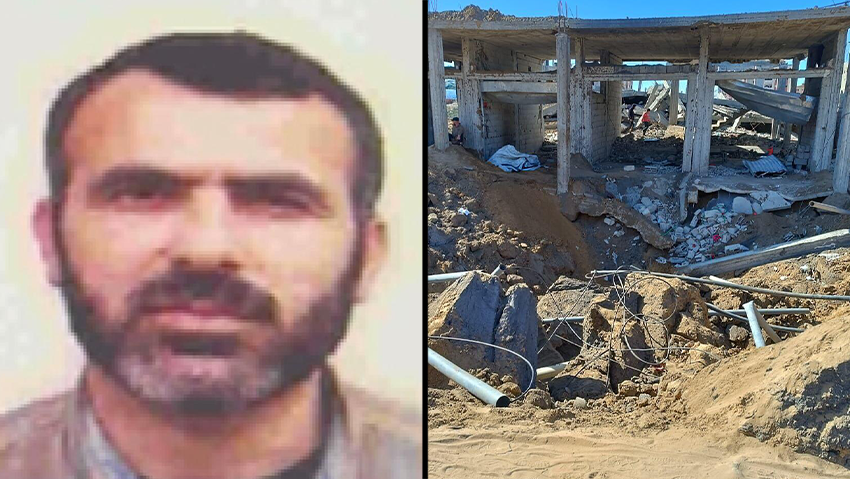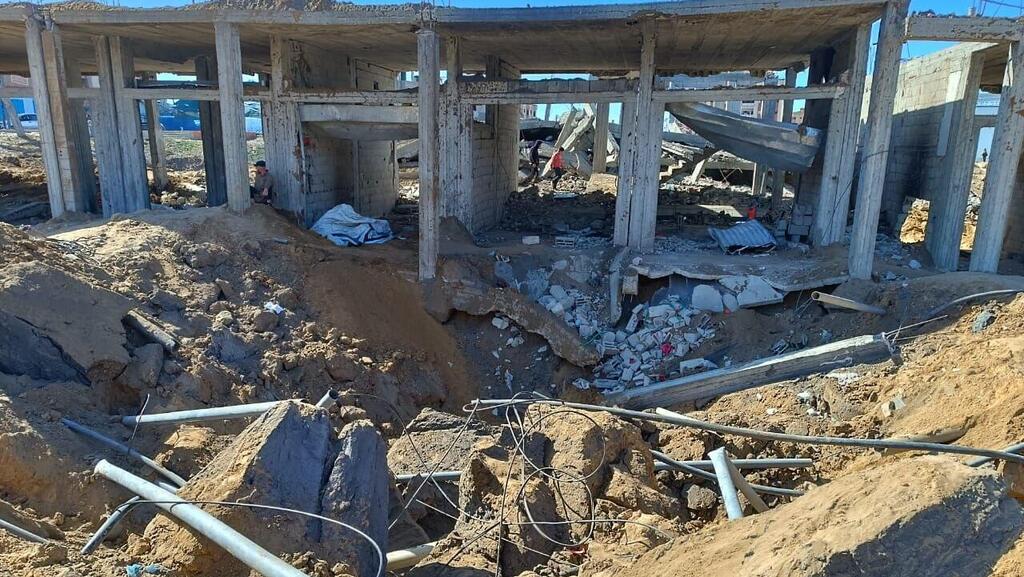Getting your Trinity Audio player ready...
Marwan Issa, No. 3 at the top of the Hamas leadership in the Gaza Strip and the deputy to Hamas' supreme military commander Mohammad Deif, was killed in an airstrike in the Nuseirat refugee camp earlier this month, IDF spokesman Brigadier General Daniel Hagari confirmed Tuesday evening. This confirmation puts an end to speculation about whether Issa is dead, after the United States confirmed such reports last week.
This is the most significant killing in the Gaza Strip since the outbreak of the war. In January , Saleh al-Arouri deputy chairman of Hamas’s political bureau and a founder of the terror group's military wing was killed in a blast in the Hamas offices in Beirut's Dahieh quarter.
"We checked all the intelligence and we are certain," Hagari said from the defense headquarters in Tel Aviv. He noted that, along with Issa, Ghazi Abu Tama’a, a senior Hamas official who was at the scene of the assassination and served as the head of the combat and administrative assistance staff in the terrorist organization, was also eliminated.
2 View gallery


An attack in the Nuseirat camp to eliminate Marwan Issa
(Photo: IDF Spokesperson's Unit)
"They were eliminated in a complex and precise strike, based on the intelligence of the Intelligence Directorate and the Shin Bet who worked together, along with the unusual execution and attack capabilities of the Air Force,” said Hagari. “We will continue the supreme effort to pursue and reach the leaders of Hamas.”
Issa was one of the architects of the terrorist attack of October 7 - and was also involved in the planning and execution of the attack in 2006 in which Gilad Shalit was kidnapped.
The air strike in Nuseirat took place overnight between March 9 and 10. Even a few days after the attack there were reports of "indications" that Issa had been killed, but the security establishment was very careful not to make an unequivocal determination of his death before clear evidence was received.
Last week it was reported that the vast intelligence on Hamas that Israel gathered during the war contributed to Issa's assassination, which gave it a comprehensive picture of the inner workings of the terrorist organization. Various sources who spoke with the NBC network said that the U.S. also contributed to the intelligence gathering, through electronic eavesdropping. According to the sources, the intelligence successes allowed Israel to locate and eliminate Issa.
Issa, 59, is the deputy head of Hamas' military wing and one of the terror group's founders. He is known as "the man of the shadows" and the right-hand man of Mohammed Deif. He was arrested during the first intifada for his Hamas activities and spent five years in Israeli custody. He was also detained by the Palestinian Authority and was only released during the second intifada. He joined Hamas at a young age, and in Israel it is said that as long as he is alive the psychological warfare with Hamas will continue.
The "strategic brain" of Hamas
Issa played a central role in the development of military systems in Hamas' Al-Qassam Brigades and became a wanted figure in Israel. His name featured prominently among the most wanted in Hamas and was targeted by Israel in 2006 during a meeting he held with Deif and other leaders, as well as in 2014 and 2021 when his house was bombed and his brother killed. His face was not publicly known before 2011, and he was photographed during the reception of prisoners released in the Gilad Shalit deal.
Unlike many Hamas leaders, Issa remained in the Gaza Strip. His son was killed in an airstrike in December, and his oldest son died about a year ago due to illness; at that time Issa failed to get him out of the Gaza Strip for medical treatment.
Issa was one of the planners of the Hamas attack on October 7, and his elimination is a severe blow for Hamas. The managing director the Institute for National Security Studies and former head of the Military Intelligence Directorate, Maj. Gen. (Res.) Tamir Hayman., said this month: "He was a multifaceted figure who simultaneously held three roles. He was the 'Defense Minister' of Hamas, meaning he was a member of the Hamas government; additionally, he was the 'Deputy Chief of Staff,' serving as the deputy head of the military wing. Perhaps most importantly, he was the strategic mind of Hamas. Under the guise of his role as 'Labor Minister,' he played a central role in the Hamas movement, in a broader sense than just the military aspect," Hayman added. "Beyond that, he was a close confidant of (Hamas leader Yahya) Sinwar. He was his balance and managed to largely control Sinwar's psychological volatility. As a very close friend of Deif, he was the one who connected Sinwar to Deif. So, yes, the public may not know him, but sometimes the connecting factor is almost as important as the leader himself."




